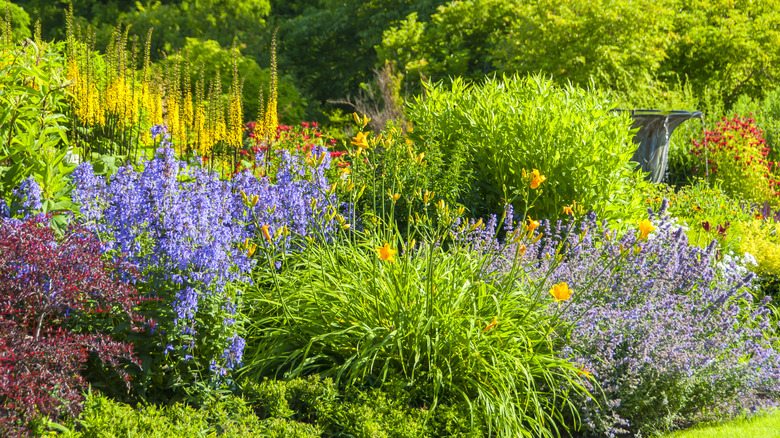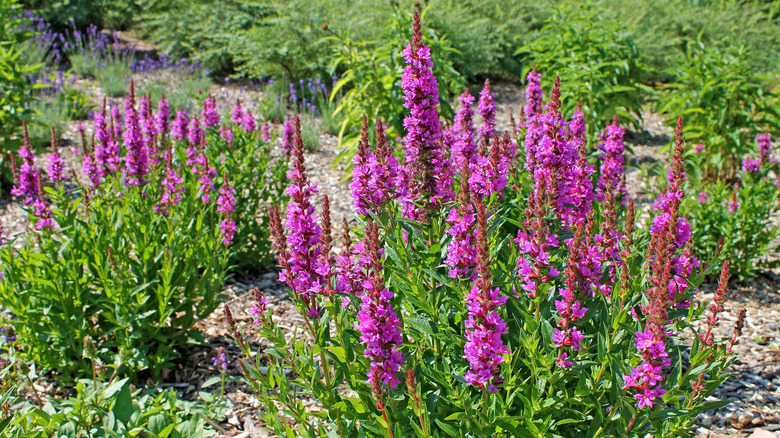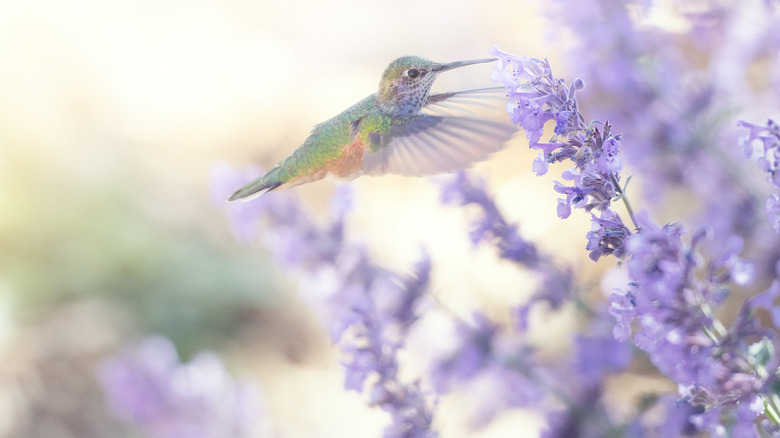Perennials That Will Never Leave Your Garden Once Planted
Perennials are a gardener's BFF. Literally. These resilient plants return year after year, bringing beauty and charm to a garden without the need for replanting. While many of them require occasional maintenance and care, there are certain varieties that are renowned for their ability to thrive and endure, making them steadfast fixtures in any garden. Black-eyed Susans, irises, and peonies add beautiful pops of color throughout the late spring and early summer. Rosemary, lavender, and fennel offer fragrant additions to any garden, while asparagus, strawberries, and rhubarb are edible staples that reappear every spring and summer. Some perennial plants offer numerous advantages to both the garden ecosystem and the gardener. From attracting pollinators and beneficial insects to improving soil quality and controlling pests, beneficial perennials are an essential component of a thriving garden.
Though perennials are generally appreciated for their reliability and longevity, it's important to be careful when selecting and planting certain varieties in your garden. Some perennials — like purple loosestrife, orange daylilies, and mint — have a tendency to become invasive, spreading aggressively and outcompeting other plants in the area. These invasive plants disrupt ecological balances and are difficult to control once introduced. To maintain a healthy ecosystem, it's paramount to be aware of these potentially invasive perennials and exercise caution when incorporating them into your garden.
Invasive perennials to avoid
Though purple loosestrife is composed of beautiful spikes of purple flowers, it is notorious for its invasive nature. This perennial can quickly take over wetlands, ditches, and other waterlogged areas, choking out native plant species and disrupting natural habitats. If you choose to grow purple loosestrife, consider planting sterile cultivars that do not produce viable seeds and regularly remove any seedlings or spreading roots.
Orange daylilies, also known as ditch lilies or tiger lilies, are tough perennials with vibrant orange flowers. They have a tendency to escape gardens and spread into natural areas, forming dense colonies and outcompeting native plants. Consider growing alternative daylily varieties that are non-invasive, or try planting them in individual containers to prevent them from sprawling across your property.
Mint, both fragrant and incredibly versatile in both foods and beverages, is also a terrifically invasive herb that will choke out the rest of your garden. The roots grow quickly and will conquer an entire garden bed if you're not careful. It's better to plant mint in a container on your patio, but if you're wed to having it in the ground, plant it in a vessel first to contain the roots, and then plant that vessel in the ground to prevent it from multiplying.
Beneficial perennials for your garden
For those seeking perennials that attract pollinators, salvia is an excellent option. Butterflies and hummingbirds in particular love to drink from these regal flowers. Belonging to the sage family, salvias include a variety of species. They produce beautiful vibrant flowers in hues of blue, purple, red, and white, creating a tall display of clustered aromatic blooms. They are drought-tolerant plants that thrive in sunny locations, making them ideal for xeriscaping — or landscaping requiring little irrigation.
Another hardy, low-maintenance perennial is yarrow. Composed of clusters of small, delicate flowers in yellows, reds, and pinks, yarrow also attracts beneficial insects like bees and butterflies, contributing to pollination in the garden. Yarrow is also deer-resistant, making it an ideal choice for gardens in areas with deer populations. Additionally, yarrow has a deep root system that improves soil structure and nutrient uptake, enhancing the overall health of the garden. It tolerates a wide range of soil conditions and adds beauty and charm to any landscape.
Planting geraniums in your garden comes with a host of benefits. These resilient and colorful plants add a vibrant touch, and geraniums are natural insect repellents, keeping unwanted pests like Japanese beetles and earworms away. They make incredible companion plants, particularly for corn, grapes, and roses. Some species are even edible and can be ground up to make tea or oils. Whether you're looking for low-maintenance gardening or a burst of color, geraniums are a reliable addition to a thriving and lively garden.


